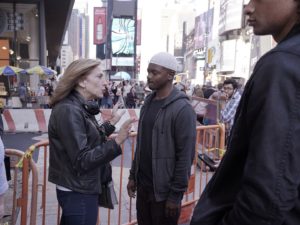
Photo: JoJo Whilden/SHOWTIME
“Back when the American Government actually sponsored the arts,” recalled Homeland executive producer Lesli Linka Glatter, invoking a long-ago incarnation of the USA, “I had a grant to perform in the Far East.”
That grant, to study and perform in places like Paris and London, and eventually the Far East, found her in Japan, after some time at the Beijing Opera School, and learning Balinese Dance.
In a Robert Frost-like “Road Not Taken” moment, she also found herself in Japan, in front of two different coffee shops one morning, needing a cup of, well, java. “I picked the one on the right,” she recounted, and thereby spent the rest of the day inside talking to an “older Japanese man in his 70’s. He spoke twelve languages fluently.”
He was then currently head of cultural affairs for Japan’s largest newspaper, and a friendship was struck. Three years later, this same man told Glatter “a series of stories that happened to him in different wars.”
And those stories moved Glatter, the dancer, so much, she decided to make a short film about them.

Photo: JoJo Whilden/SHOWTIME
The half-hour narrative feature was done out of a directing workshop for women at AFI, in Japanese with subtitles, and included flashbacks, a narration track, and a portion set in WWII. She added “very fortunately for me [it] got nominated for [an] Academy Award for short film.”
So the journey started by a cup of coffee eventually lead this dancer/choreographer to a director’s chair, where she helmed episodes of everything from Spielberg’s Amazing Stories, to Twin Peaks, West Wing, Mad Men, and many many more. Including, of course, Homeland, where she is also an executive producer (as she was similarly on The Leftovers, Six, and others).
As a producer, unlike in the Washington portrayed on the show, she has what she calls a “no asshole policy–with the idea you want to create a good working environment. When I come in as guest director,” she continued, “I try to learn everyone’s name on the first day. If you respect everyone’s work and their process, it’s going to create a better environment.”
As for how she works as a director, is it all choreographed in advance, so to speak, or is there some free-form dance in there? “I come in and I plan everything,” she said, “but I (also) want magic to happen. I want to see what the actors do, and if the DP comes to me and says ‘hey what do think about this?’ I’d be crazy not to listen to that.”

Photo: JoJo Whilden/SHOWTIME
“If you only have ten days to shoot something,” she continued, as opposed to the three or so months you’d have on a feature, then “you better know how to shoot something. You really need to know what your story is about. Don’t schedule your most important scene at end of day when everyone’s exhausted.”
But what’s energizing for Glatter is that TV itself has become such a vital medium, perhaps no surprise for someone who, after all, began with Twin Peaks. “It’s very exciting because you get to delve in deep to characters. Good storytelling is good storytelling, regardless of what the delivery system is.”
To keep delivering those good stories to Homeland, Glatter, along with the other producer/directors, go, with “the writers, Claire Danes and Mandy Patinkin, to Washington, D.C. once a year and meet with the intelligence community. And out of those meetings, comes the next season.” The plotlines of which, she noted, are “often called prescient.”
Does that mean that the production staff knew ahead of time about America’s current predicament? “I don’t think that was anything that anyone had planned,” she said.

Photo: Stephan Rabold/SHOWTIME
Meanwhile, her own planning continues apace: “I’m in prep on a miniseries that’s just beginning. First time I’m doing anything for network TV in years and years. It’s about the Menendez brothers.”
Her 80’s-era research material is currently all over her wall, but that’s all part of the process for this teahouse-fated former dancer: “I love what I do. I love being a storyteller.”





